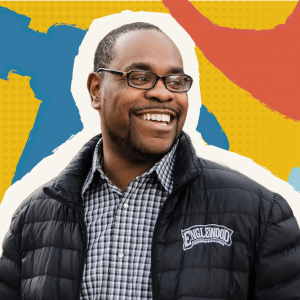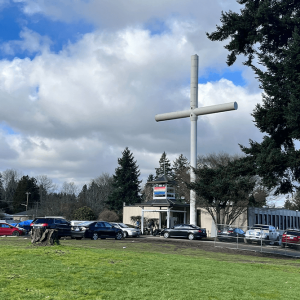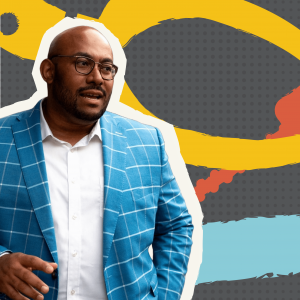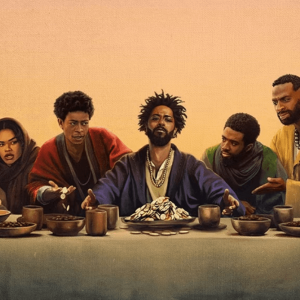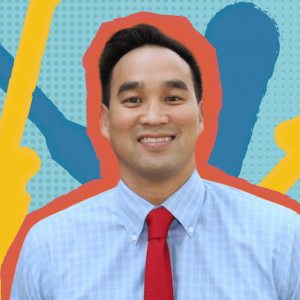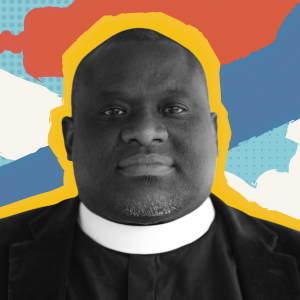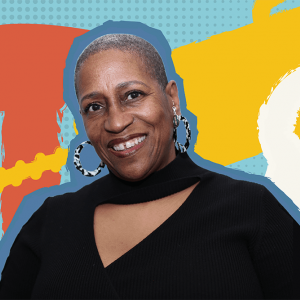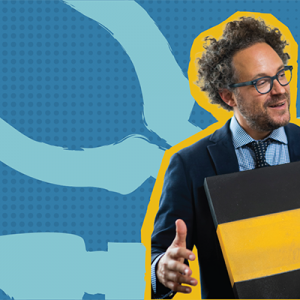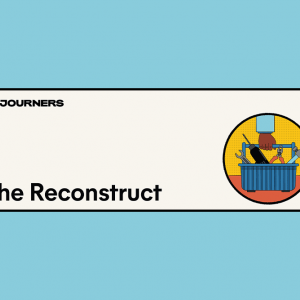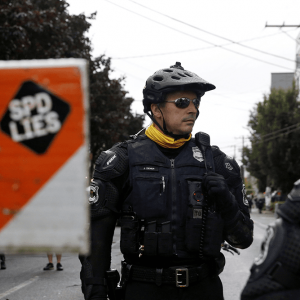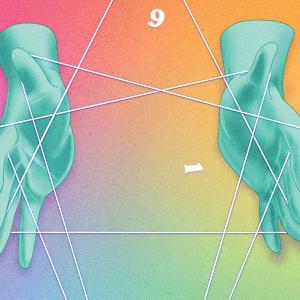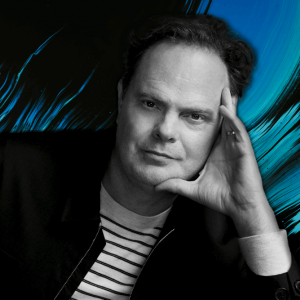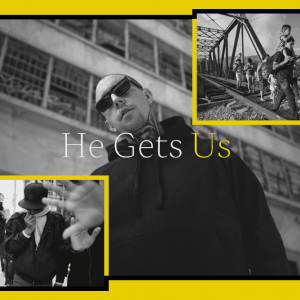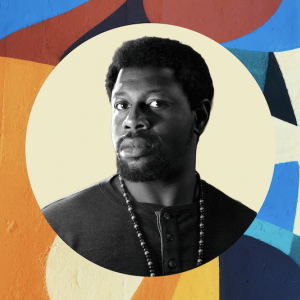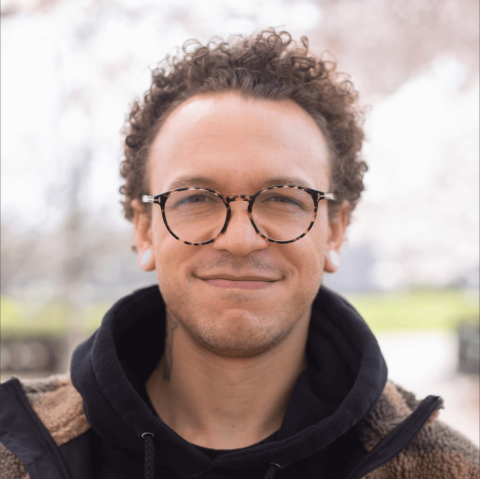
Josiah R. Daniels (he/him) is the senior associate opinion editor at sojo.net. He is a native of the southwest suburbs of Chicago, but currently resides in the Pacific Northwest with his wife.
The first thing Josiah ever wrote was a devotion for his youth group when he was 13. And while that devotion was never published (this is for the best), it did solidify his love for writing. His writing centers around race, politics, and religion. His other interests, such as hard bop and avant-garde jazz, sci-fi, cults, and the Hebrew Bible, also appear in his writing. Josiah has written for Geez magazine, The Bias Magazine, Religion Dispatches, and Sojourners, which has been Josiah’s favorite magazine since his college days. NPR’s Weekend Edition interviewed him about a piece he wrote criticizing an ad campaign’s effort to rebrand Jesus.
Josiah lived on Chicago’s West Side for three years. There, his neighbors taught him the importance of integrating faith with direct action, a lesson that continues to influence him today.
When not reading, writing, or collaborating with authors, he is watching the Chicago Bulls, playing basketball, or taking full advantage of his PBS Passport membership.
Posts By This Author
Progressive Christians Aren’t Always Better Neighbors
I originally met educator and grassroots theologian David Leong in 2016 after I emailed him on a whim, telling him I was coming to visit friends in Seattle and that I’d like to meet him for coffee. I had just read an advanced copy of his book Race and Place, about churches in urban contexts, and was impressed by the conversational tone it took when addressing issues like race, class, and gentrification.
Christian Community Development Was Born in Chicago
Jonathan Brooks is now the lead pastor of Lawndale Christian Community Church in the Chicago neighborhood of North Lawndale. The major theological conviction of LCCC is to love God and love the neighborhood, which is predominantly Black and has experienced years of government disinvestment. The way the church community puts into practice its theological convictions is by working with neighbors to improve the material circumstances of all who live there.
How a Methodist Church Accidentally Became a Refugee Shelter
For more than a year, Riverton Park United Methodist Church in Tukwila, Wash., has been a cramped, uncomfortable shelter for hundreds of refugees. Neither designed nor intended to be a camp for those navigating the complicated immigration and asylum process, the ongoing situation has become a crisis, with the city declaring a state of emergency last October. Still, as Riverton Park remains unwilling to turn people away, the church and its neighbors, community organizers, and local government are all seeking solutions to the crisis.
How AfroLatine Identity Can Expand Our Understanding of Faith
I love documentaries. I try to watch a minimum of one per week. I am especially drawn to documentaries like Born in Synanon — a documentary about a rehab community that eventually became a cult — because it wrestles with questions around race and religion. These two subjects are endlessly fascinating to me.
So, when I heard about Faith in Blackness, I knew I would have to see it. In October 2023, one of the executive producers, Josué Perea, invited me to a screening at the University of Washington. The documentary explores the relationship between AfroLatine spirituality and how that spirituality shapes a person’s identity and understanding of the divine.
Michael Wear Wants Christians To Get More Political
Michael Wear’s book makes the argument that for Christians to engage in politics responsibly and approach political conversations openly, they must focus on spiritual formation, discipleship, and centering Christ in all that they do. Politics “shapes us spiritually,” Wear writes in the book. And he hopes Christians will place their political action under the authority of Christian discipleship.
‘The Book of Clarence’ Is a Gangster Epic of Biblical Proportions
Director Jeymes Samuel’s newest movie, The Book of Clarence, is not just a biblical epic but a Black biblical epic.
What DEI Trainings and Evangelical Retreats Have in Common
Tran won’t settle for simply critiquing racial capitalism or popular anti-racist enterprises that steer clear of economics. Tran believes that Christian theology offers an alternative story to the economy of racial capitalism, an alternative that finds its locus in what he describes as the “divine economy.”
Olga M. Segura on the Religion at the Heart of Revolution
“Something I often heard was that ‘there’s not enough Black Catholics.’ [That] the numbers of Black Catholics are not big enough to justify doing a survey into this community. But that was in complete contradiction with what I was seeing when I was at these rallies and with people who were engaging with the Black Lives Matter movement.”
The Pentecostal Pastor Who Wants to Combat Violence With Holy Imagination
When I was living on the West Side of Chicago, friends and family would often say that they couldn’t comprehend why I would want to live in such a “dangerous” area. The exchange would usually go something like the following: “I can’t imagine why you’d want to live in Chicago, considering all the gun violence.” “Are you worried about me being shot by the police?” “Well, no. The criminals are the ones who are shooting people.” “The police shoot people too. And there’s a reason the ‘criminals’ are resorting to violence.”
I would then go on to explain the antecedents to Chicago’s gun violence: racial segregation and systemic disinvestment. Beginning in the 1950s and into the ’70s, white Chicagoans fled the South and West Sides because they couldn’t imagine being neighbors with Black people. Because of this, these areas became predominantly Black, and the city has refused to invest resources into these neighborhoods to reverse their poor conditions. The South and West Sides are still suffering from disinvestment today, and this disinvestment is a major contributor to gun violence.
Why Black and Palestinian Christians Need Each Other
Honestly, I never thought much about Israel before college. Then, during my sophomore year, a prominent New Testament studies scholar had been invited to speak on campus; after it came to light that they were openly critical of the state of Israel, they were summarily disinvited. A few other students and I were still able to meet with the scholar, and we were shocked by the language they were using to describe the conditions in Israel for the Palestinians: “Second-class citizens,” “genocide,” and “apartheid” were the terms that struck me most.
“It can’t be as bad as what Black people have faced in the United States or what they faced in South Africa,” I remember saying to the scholar. “Go and see,” they admonished. And so, one year later, that’s exactly what I did.
When the Institutional Church Dies, What Comes Next?
While I was attending seminary, I came across a book outside of our assigned texts that would help transform my thinking on LGBTQ+ inclusion in the church. The name of the book was Our Lives Matter: A Womanist Queer Theology, and the author of the book was womanist theologian Pamela R. Lightsey.
Up to that point in my life, I had been taught that being a Christian while also proudly identifying as a member of the LGBTQ+ community was impossible. But Lightsey’s Our Lives Matter challenged those preconceived notions as she argued for full LGBTQ+ celebration within the universal church. I began to realize that my discrimination was not only hurting LGBTQ+ people, it was also hindering my ability to imagine a world in which all people could be free. The lesson I took away from that book was this: If we don’t have the capacity to imagine a world in which LGBTQ+ people are free to be fully themselves, then our imagination of liberation is truncated.
Aaron Rosen Considers the World As Jesus Saw It
Growing up as a Christian in the U.S., I was told that Jesus came to die on the cross for our sins and establish the Christian religion. It’s embarrassing to admit, and stands as an example of the way in which casual antisemitism saturates Christianity, but it was not until my college years, after encountering Chagall, that I realized Jesus was distinctly Jewish and that Jews had been offering unique and refreshing ways to see Jesus throughout history.
Writer, art curator, and expert, Aaron Rosen is continuing that tradition, offering new ways to see Jesus from his context as a practicing Jew by inviting people to imagine Jesus as a visual thinker. Aptly titled What Would Jesus See, Rosen’s book encourages people of all backgrounds — Christian, Jewish, or no religion at all — to imagine “how Jesus saw, what he saw, and why this is important today.” The shift from “What would Jesus do?” to “What would Jesus see?” may seem like a way to deemphasize Jesus’ actions. But as Rosen writes: “For Jesus, seeing was doing. At the core of his short ministry was a recurring call to look at the world—and especially its most disadvantaged denizens—with new eyes.”
‘Lock Him Up’? Should Christians Want Trump To Go to Prison?
One of my favorite passages in the Bible is from in Isaiah 61:1: “The spirit of the Lord God is upon me, because the Lord has anointed me; he has sent me to bring good news to the oppressed, to bind up the brokenhearted, to proclaim liberty to the captives, and release to the prisoners.” Christians will be familiar with this passage as Jesus quotes it when he stands up to read in the synagogue during the early days of his ministry (Luke 4). It’s a passage that gives me some hope for Christianity, since the central character of our religion believed that even the worst-of-the-worst deserve forgiveness.
Why We’re Launching The Reconstruct
In launching The Reconstruct, Sojourners’ newest newsletter, we hope to continue what we have been doing, but with more regularity: Offering thoughtful, constructive conversations with folks who are changing the world and reforming our faith.
A Piss-Poor Christian Witnesses How the Police Treat Jesus
I was supposed to be taking a writing day this past Monday, but the sound of sirens kept distracting me. Sirens in my Seattle neighborhood are not unusual, but the sirens blared from early morning until noon. By that time, I’d heard 10 or more police cars drive by, which felt different. So, during my lunch break, I resolved to walk down the street to see what all the hullabaloo was about. I figured I wasn’t getting any writing done, so I might as well go investigate.
Can the Enneagram Make Us Better Christians?
IN 2011, I took a course at my Christian college about the personality type system known as the Enneagram.
The Enneagram is a system built around nine personality types, with each type providing a unique perspective on how we navigate our relationships, emotions, and the world around us. The Enneagram draws on both spirituality and psychology, which distinguishes it from many other personality indicators.
A primary question that emerged for me from that college class: Does the inner work that the Enneagram encourages manifest itself in the outer world through justice work, or is the Enneagram primarily a tool meant to encourage people to focus on individual healing, career, and spirituality?
Throughout history, questions about how and why each human has a unique set of behaviors, motivations, emotions, and cognitions have preoccupied philosophers, psychologists, sociologists, religious thinkers, and Buzzfeed quiz creators alike. Indeed, in the 21st century, “know thyself” is less of a thought-provoking ancient Greek aphorism and more of a cultural imperative lauded by the self-help industrial complex and career coaches. We are assured that by unlocking our “true selves,” we will ultimately be unlocking our true potential, which will drastically improve our fortunes.
But the Enneagram was never meant to simply measure our potential or provide a definitive answer to the question of human personality. This is contrary to some of the most popular personality indicators such as Myers-Briggs or CliftonStrengths (formerly StrengthsFinder), which became popular because they promised to help employers tap into human potential and productivity. The Enneagram originated as a tool for contemplation but has come to emphasize how self-growth and inner work prepare us for the outer work of building community.
daniels.enneagram.inline1.jpg

In their book The Enneagram: A Christian Perspective, Catholic priest Richard Rohr and Lutheran minister Andreas Ebert point to a 4th-century Christian Desert Father, Evagrius Ponticus, as the first to use, loosely, the nine-pointed symbol to highlight vices that he believed interrupted one’s inner peace and relationship with God. But it wasn’t until the 1970s that Chilean psychiatrist Claudio Naranjo, inspired by a theory originated by Bolivian philosopher Oscar Ichazo, used modern psychology to develop a theory of nine distinct personalities — or “enneatypes” — that highlighted the vices, virtues, and core motivations of each type.
The Enneagram is sometimes treated as just another personality test that can help us purchase the things that “match” our personalities, find romance, or unlock our “true potential” so we can make more money — part of our culture’s obsessive focus on self-improvement. But at its best, the Enneagram not only emphasizes making peace with yourself and a higher power, it also offers tools for learning how to be in community and build a more just society.
To help me sort through my questions, I interviewed three Enneagram experts: Chichi Agorom, an associate faculty member with The Narrative Enneagram and author of The Enneagram for Black Liberation; Jessica Denise Dickson, a life empowerment coach and Enneagram guide who uses the Enneagram in anti-racist workshops; and Abi Robins, a queer, trans Enneagram teacher, coach, and author of The Conscious Enneagram. Their responses have been edited for length and clarity. — Josiah R. Daniels
Rainn Wilson of ‘The Office’ Wants a Spiritual Revolution
I don’t know what shocked me more: The fact that actor Rainn Wilson — best known for his role as Dwight Schrute on the hit TV show The Office — had written a book about religion and spirituality or that I was able to interview him.
I am a millennial and for many of us, “spirituality” means being “spiritual but not religious.” I’ve heard my peers say things like, “I’m looking for spiritual healing,” or “I’m trying to find God for myself,” or “I’m wanting to get in touch with my own divinity,” or “I contain multitudes.” Perhaps there’s a kernel of truth in some of those statements but the thing that stands out to me is this: It kinda just comes off as individualism baptized in “holy” hyperbole.
What I appreciated about Wilson’s Soul Boom: Why We Need a Spiritual Revolution (out April 25) is that it offered a gentle critique of this version of individualized spirituality. For Wilson, who is a member of the Baha’i faith, spirituality has a larger purpose beyond the self. Spirituality gives us eyes to imagine a society based on “justice, equity, love, and a reduction in unnecessary pain for the inhabitants of our beautiful planet. To build the kingdom of God on Earth,” as he writes in the book. So, from this perspective, seeking inner peace should not only lead to spiritual tranquility but also public tranquility. If this is what pure and undefiled spirituality might look like, then color me intrigued.
Wilson and I talked about topics ranging from cultural appropriation and Christian representation in the media, to communism and how religion is portrayed in The Office. Considering all the topics touched on in Soul Boom, it only seemed right to cast a wide net during our conversation.
What ‘He Gets Us' Ads Get Wrong About Jesus
When I first noticed the ads on TV last March, I was cautiously optimistic. Each ad features an array of black-and-white photos with people in contemporary settings followed by a simple, relatable slogan on a plain black screen: “Jesus was wrongly judged,” “Jesus suffered anxiety, too,” “Jesus struggled to make ends meet, too;” each ad ends with the campaign’s tagline, “He get us. All of us.”
Olúfẹ́mi O. Táíwò Reconsiders ‘Centering the Marginalized’
“Centering the marginalized” is common parlance among both Christian and secular social justice advocates. This especially makes sense for Christians, as it was Jesus who said, “the last will be first, and the first will be last” (Matthew 20:16). So when it comes to seeking justice, it makes sense that we’d try to prioritize the experiences and perspectives of those our society discriminates against because of religion, race, gender, sexual orientation, or other identities. But two examples from this past year have made me doubt the viability of an identity-based approach for pursuing social justice.
How My Conservative Christian College Made Me a Leftist
My school tried to purge any evidence of liberation theologies, Christian critiques of the economy, or radical solidarity with the poor, hoping to indoctrinate students with a conservative ideology. But there was an underground community at my school that helped me make a pivotal realization: By Christian college standards, Jesus would be labeled “an extreme leftist” because he embodied class solidarity with the poor, damned the rich, and imagined an alternative community. That gospel appealed to me in college; it still appeals to me today.

